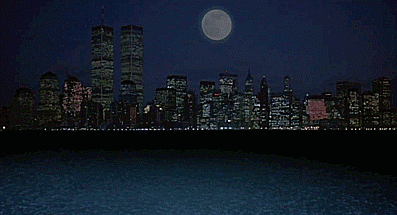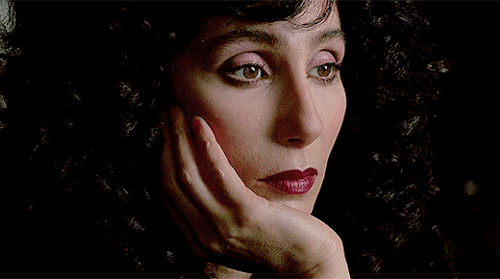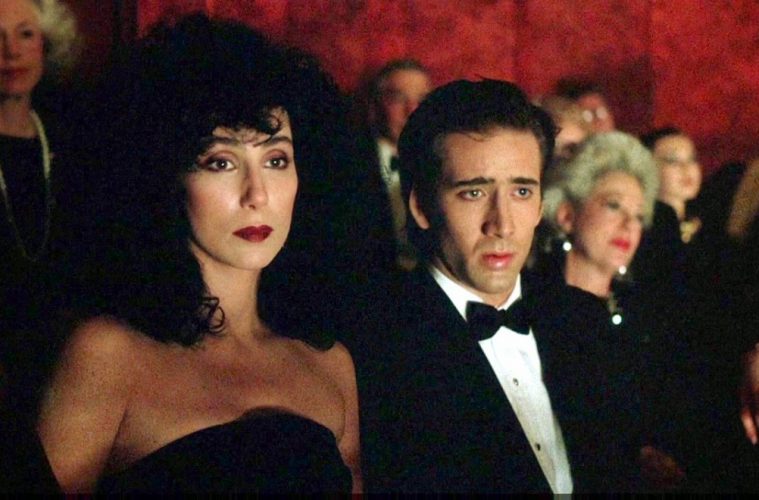If you have ever gazed up at the Full Moon against a clear night’s sky and felt an immediate, mesmerising lull towards the celestial body, then you are not alone. You don’t have to be a keen astrologist to appreciate the arresting intensity of the glow of a Full Moon, yet throughout history, civilisations have come to view the rocky satellite as a subject of fascination and worship. It has been assigned a myriad of deities (Diana, Chang’e, Artemis, Selene, Thoth etc.), nations have attempted to claim it by staking their flags in its rocky surface, we have created libraries of songs and collections of artwork inspired by it, and several cultures today still observe a lunar calendar. We, as a species, are simply and inexplicably drawn to the Moon.
The notion of being moonstruck—crazed, afflicted by the influence of the Moon, so romantically smitten that you are unable to act or think rationally—provides the backbone to Norman Jewison’s aptly-named 1987 romantic comedy, written by John Patrick Shanley and starring beloved cultural gems Cher and Nicolas Cage. Set in a tight-knit Sicilian-Italian community in Brooklyn, Moonstruck explores the very ways that family dynamics, personal beliefs, relationships, personalities, and cultural attitudes are subject to evolution and change—so long as the Full Moon is involved, of course. With regular interspersions of Earth’s luminous satellite visually spliced between scenes of significance, we are constantly reminded that the actions of our characters are not entirely independent or autonomous; the Moon has a pervasive part to play in the engineering of the narrative.
When the film opens with Dean Martin’s 1953 famed tune, “That’s Amore,” we are thrust into the charm and intimacy of the Italian diaspora in New York. In its radiance, the Full Moon gleams brightly on the East River and hovers over the glistening bulbs that line both the Brooklyn and Manhattan Bridges. As Martin’s melodic voice croons over the accordion and Neapolitan-inspired instrumentals, there is a rich sense of traditional identity, even if the montage feels like a pastiche of stereotypically Italian tropes. That the film opens at night, and more so on a night of a Full Moon, signifies how the wheels of transformation are already set in motion; we are to embrace and welcome the changes stirring within our central characters.
As buildings are adorned with outdoor fairy lights and brightly-lit Christmas trees stand erect in public spaces, we are also made aware of the excitement that this particular time of year tends to reel in; the brink of a new year, where the possibilities of tomorrow can be realised, the mistakes of yesterday can be forgotten, and the opportunity to reinvent oneself is on the horizon. At the Lincoln Center, a lone man wheels in the newly updated display for the Metropolitan Opera season. Giacomo Puccini’s popular oeuvre La Bohème is to be performed. Its significance lies in its ability to act as a vehicle for Moonstruck’s dramatic revelations. Several songs from the opera play both diegetically and non-diegetically throughout the film; it represents Italy’s artistic heritage and acts as a character alongside the landscape of the city. Brooklyn is virtually empty, but, bathed in moonlight, it is a beautiful sight to behold.

The story of Moonstruck is such: Loretta Castorini (Cher) is a 37-year-old widow who lives at home in Brooklyn Heights with her mother, Rose (Olympia Dukakis), her father, Cosmo (Vincent Gardenia), and her unnamed paternal grandfather (Feodor Chaliapin Jr.). It would be a conventional family dynamic except that her wizened grandfather owns five dogs that bound throughout the house, her deadpan mother has seemingly lost all enthusiasm for life, and her aloof father channels his fear of death into an extra-marital affair, financed by his conniving practices as a swindling plumber.
Loretta is not a romantic woman—at least, she doesn’t overtly seem to be, with her pragmatic and bossy disposition, her often drab and frumpy appearance, or her mundane job in a funeral home. She is loud, she is bossy, and she has to constantly care for those around her—fixing her boss’s tie at work, for example. But there are glimpses of a woman who was once in love, like when she dismisses the sight of red roses—“The guy who sends those spends a lot of money on something that’s gonna end up in garbage”—but then is handed a singular rose by the florist and brushes it against her face, smiling sweetly to herself.
Loretta is dating Johnny Cammareri (Danny Aiello), a Sicilian man whose clownish and socially-inept persona has earned him the label of “big baby” from others. She doesn’t love him, she tells her mother, but when Johnny proposes to her in the Italian ristorante Grand Ticino—guided step-by-step as per her frustrated instructions—she accepts. However, Johnny leaves for Sicily that same night, as his mother is dying. They set the wedding date for a month’s time, and Loretta is left with instructions to invite Ronny—Johnny’s estranged brother who still operates the family bakery, and whom he hasn’t contacted in five years—to their wedding.
It all seems simple and straightforward, but Loretta’s past involved her previous husband being struck by a bus some seven years ago—due to “bad luck,” she believes. And at first, her father is completely against it; he won’t pay for the wedding. When they argue, he berates Loretta that marriage is temporary, to which she responds (in a heavy Brooklyn accent), “Everything is temporary! That don’t excuse nothing!” A calm Rose addresses her husband’s lie that he has no money—“You’re rich as Roosevelt, you’re just cheap, Cosmo”—and then tells her daughter, “He didn’t used to be cheap. He thinks if he holds onto his money, he will never die.” In all this talk of marriage and finances, it is clear that Loretta’s parents’ relationship has changed and grown unromantic over time; it sharply contrasts Cosmo’s glitzy and decadently tacky relationship with his mistress, Mona (Anita Gillette).
When Loretta first makes contact with Ronny (Nicolas Cage), he is brash over the phone, still embittered over the falling out with his brother. So, she visits him in his bakery, where he is tasked with operating the furnaces that bake the bread. It is a hot, cloying, and volcanic working environment that fuels his anger towards everyone. We first see Ronny’s back, with his wiry and greasy arms coated in charcoal ash, his dirt-stained vest. He is antagonistic—almost animalistic—as he paces around the room, glistened with sweat. “I have no life,” he tells Loretta. “My brother Johnny took my life from me.” When pressed on the matter, he explodes: “What is life? They say bread is life. And I bake bread, bread, bread,” he snarls as he throws baguettes like javelins for emphasis. “And I sweat, and shovel this stinking dough in and out of this hot hole in the wall and I should be so happy.” In the climactic moment, he pulls off the glove which has been hiding a wooden hand, and exclaims, in true Cage German-Expressionist form, “I lost my hand! I lost my bride! Johnny has his hand! Johnny has his bride! You want me to take my heartbreak, put it away and forget?” He blames his brother for distracting him at the bread slicer, where he not only lost his hand, but also his fiancée, and any remaining notion of happiness in his life. His stormy and volatile nature predictably attracts Loretta like a moth to a flame, and, as in all good romantic comedies, they fall passionately in love.
Moonstruck is just as occupied with its older characters as it is with the guilt-ridden romance between Loretta and Ronny. And the Full Moon is what ties them all together. Cosmo’s father, troubled by his son’s refusal to pay for his granddaughter’s wedding, often congregates with his fellow octogenarian (possibly nonagenarian) buddies to discuss their life issues. There is an often painful reminder of mortality in his scenes, first as he visits the grave of (presumably) his wife, and his solitary night walks with his dogs. The only time we ever see him smile or express joy is on the night of a Supermoon, where, stood at a pier—against the backdrop of Manhattan’s twinkling skyscrapers and the Moon’s image in full view—he howls and gesticulates towards the sky. “La bella luna!” he shouts in elation, encouraging his canine friends to howl at the Moon with him. It is a poignant image; of an old man battered by time, a living relic of the past laughing in the face of the modern and contemporary world—both old and new versions of the city sharing the frame. The Moon above, however, remains timeless. When Rose’s brother, Raymond (Louis Guss), and his wife, Rita (Julie Bovasso), are over at the Castorini’s for dinner that same evening, Raymond attempts to celebrate the news of Loretta’s engagement with a story about the early stages of Cosmo and Rose’s relationship:
“I’ve never seen anybody so in love like Cosmo was back then. He’d stand outside the house all day looking in the windows. One time, I woke up in the middle of the night ‘cause of this bright light in my face, like a flashlight, I couldn’t think of what it was. I looked out the window, and it was the Moon, as big as a house. I never seen the Moon so big before or since. I was almost scared, like it was going to crush the house. And then I looked down, and standing there, in the street, was Cosmo looking up at the windows… I got mad at you, Cosmo. I thought you had brought that big Moon over to my house, because you were so in love and woke me up with it.”
It is a lovely sentiment that has been echoed throughout cinema, that of the lovesick individual gifting the Moon as a gesture of love. In It’s a Wonderful Life (1946), James Stewart’s character offers to “throw a lasso over it and pull it down” for his sweetheart. This was parodied in a scene in Bruce Almighty (2003), where Jim Carrey’s character literally pulls the Moon closer with an invisible lasso as a declaration of love. However, this anecdote irritates Cosmo, and he snaps back, denying it ever happened. When Rose is in the moonlight-soaked bedroom later that night, she approaches her sleeping husband and acknowledges their dispirited marriage. It is clear from the way she gazes at the figure in the bed that she still loves him. She approaches the window, pulls aside the lace curtains, and looks longingly out at the Full Moon ahead.
Loretta is witnessing the same beautiful sight from Ronny’s bedroom after they sleep together for the first time, and, as the rays of moonlight spill from the venetian blinds, Ronny comes to join her, all vicious energy from before completely dissipated. It seems as if the Full Moon possesses the potential to either excite or subdue; either way, it taps into an internal essence that connects us all to each other and the Earth. When Raymond is woken up by the brightness of the Full Moon, he rouses Rita awake, too: “It’s Cosmo’s moon! The Moon that I was talking about, at dinner…” He trails off as he searches for evidence of Cosmo outside on the streets. Rita smiles at him and delivers one of the most wistful lines in the film, which brings him back to bed: “In that light, with that expression on your face, you look about 25 years old.”
If Moonstruck were a planet, this set of scenes would be the core of it, the surrounding layers of intertwining narratives carefully enveloping and converging towards its warm center. This evening, of a larger-than-usual Full Moon—a Supermoon, if you will—unifies them all, and roots them in one temporality. They are all equally affected by the sight of the Moon and its spell-binding nature, its capacity to induce change. More so, all three central relationships are depicted within the intimate spaces of the bedroom: Cosmo and Rose no longer sharing a bed because of their cooled relationship; Raymond and Rita in their playful and familiar marital bed; Loretta and Ronny as the young lovers re-discovering infatuation. It is significant that the bedroom settings provide a direct visual connection between the lunar effect and depictions of physicality and carnality.
For Loretta, the changes that she steers through are expressed by changing her appearance on a superficial level, as well as her decision to deflect from her original ethical code and the teachings of the Roman Catholic church. After her passionate night with Ronny, she visits a beauty salon and indulges in some retail therapy. The outcome is her newly-dyed 1980s perm, her freshly manicured set of striking crimson nails, a new makeup look, and a renewed interest in her sensuality. Much of the internal change that Loretta struggles to resist manifest in her physical embracement of the stark truth—that she is in love with her fiancé’s younger brother, and can’t change that. She buys a new outfit and treats herself to red wine and a silk slip.

There is much to note about sexual power in Moonstruck and its associations with primitive, animal attraction; namely, in the way that Ronny and Loretta are literally discussing wolves and brides right before they leap at each other. After their first hostile meeting at the bakery, we find Loretta in Ronny’s home cooking him a steak while he listens to vinyl records of La Bohème, his favourite opera. It is a well-decorated apartment, and we learn that Ronny is a man of culture, for art posters hang from the walls and his decor is tastefully arranged. “You’ll eat this one bloody to feed your blood,” Loretta commands as he digs into his rare steak. As they converse, Loretta brings in the discussion of animals and the sort: “You’re a wolf… the big part of you has no words and it’s a wolf. You know, the woman was a trap for you. She caught you and you couldn’t get away, so you chewed off your own foot,” she theorizes to Ronny’s growing disbelief and frustration. “That was the price you had to pay for your freedom. You know, Johnny had nothing to do with it. You did what you had to do between you and you. And now you’re afraid because you know the big part of you is a wolf that has the courage to bite off its own hand to save itself from the trap of the wrong love.”
In bringing Ronny into her analogy of a footless wolf, the film expresses a self-awareness of the irony in linking a Full Moon to the wolf. When we consider the idea of change in Moonstruck, we can visualise the transformation of lycanthropy, from a man into a werewolf. And the associations don’t just end there. Lupercalia, the ancient Roman festival of health, sex, and fertility, would eventually come to coincide with our contemporary Valentine’s Day celebrations—and, in keeping with its pagan roots, it comes as no surprise that “Lupercalia” may have evolved from the Latin “lupus,” meaning wolf. That the wolf throughout history has been associated with transformation (from man to beast and vice-versa), as a feminised bastion of fertility and womanhood (Romulus and Remus suckled from the same teat of a mother wolf), and as a cultural embodiment of carnal lust and desire (Loretta overhears a woman accusing her husband of looking at another “like a wolf”) cements its status as one of the most ancient and culturally multifaceted creatures to exist on Earth. The wolf’s natural affiliation with the Moon makes it a worthy point of comparison for Ronny, who—with his thick tuft of dark chest hair overflowing from the top of his vest—appears wolfish at times, and undergoes a personality change so radical, it seems as preternatural as the ‘change’ of a werewolf.
When Loretta agrees to accompany Ronny to the opera to see La Bohème, they don’t seem to recognise each other at first due to the changes in their outward appearances. Elegantly refined and coiffed to perfection, Loretta stands with her emboldened red lip and glamourous perm, Ronny with his gelled hair neatly combed back and donning a suave black tuxedo; they’re equally stupefied as they visually absorb their new profiles. During the performance, in a scene that surely went on to inspire Pretty Woman (1990), Loretta sheds tears at the height of the opera’s climax. She has been moved by the earnestness and rawness of the opera, and it is possible that this performance, along with Ronny’s impassioned speech in which he professes his love for her, is enough to undo her loyalty to her loveless engagement to his brother.
Change, as depicted in the film, is neither inherently good nor bad. Change is not a linear progression but can rather bifurcate, setting up alternative paths for character’s lives. Loretta chooses personal happiness over duty and therefore alters her future, when she had previously given up on a true marriage based on love and respect. Rose addresses Cosmo’s infidelity and he promises to stop his womanising ways. Cosmo’s father demands that his son pay for Loretta’s wedding but Johnny calls off the engagement when her turns home anyway: His mother has survived, and, to preserve this, he cannot marry Loretta any longer. It all culminates in a happy ending, with Ronny finally popping the question that has shadowed so much of the film’s identity. Personalities, relationships, and intentions are all given a life-changing shift in the overarching narrative of Moonstruck’s Brooklyn, which, along with the power of the Moon, is where the magic lies.

